Robert Higgs • Monday, March 26, 2018 •
 Socialism’s appeal has always lain primarily in its vision of living in a fantasy land, a land of lollipops and lemonade, a land where everyone has plenty and all have the same. Aside from the utter impossibility of attaining such abundance without private property and free markets, this vision has a fatal element of abstraction from the realities of the Iron Law of Oligarchy. It declares that “society” or “the community” will own all the means of production, but in reality this communal ownership always boils down to de facto ownership by a political elite with untrammeled power and a determination to obliterate individual rights, first private property rights, then all other rights, including the entire litany of civil rights. Socialism is a mythical, impossible ideal employed as a rhetorical enticement to mobilize large groups in favor of collective action that leads ultimately if not immediately to their own enslavement. That so many young people in the West now regard socialism as the most desirable form of political economy is a tragedy in the making.
Socialism’s appeal has always lain primarily in its vision of living in a fantasy land, a land of lollipops and lemonade, a land where everyone has plenty and all have the same. Aside from the utter impossibility of attaining such abundance without private property and free markets, this vision has a fatal element of abstraction from the realities of the Iron Law of Oligarchy. It declares that “society” or “the community” will own all the means of production, but in reality this communal ownership always boils down to de facto ownership by a political elite with untrammeled power and a determination to obliterate individual rights, first private property rights, then all other rights, including the entire litany of civil rights. Socialism is a mythical, impossible ideal employed as a rhetorical enticement to mobilize large groups in favor of collective action that leads ultimately if not immediately to their own enslavement. That so many young people in the West now regard socialism as the most desirable form of political economy is a tragedy in the making.
***
Robert Higgs is Senior Fellow in Political Economy at the Independent Institute and Editor at Large of The Independent Review. His latest book is Taking A Stand: Reflections on Life, Liberty, and the Economy.
Vicki Alger • Wednesday, March 21, 2018 •
 Florida is now the first state in the country to offer students scholarships to attend safer schools.
Florida is now the first state in the country to offer students scholarships to attend safer schools.
Last week Governor Rick Scott signed legislation creating the Hope Scholarship Program, which offers scholarships to public school students victimized by an array of safety incidents, including:
- battery,
- harassment,
- hazing,
- bullying,
- kidnapping,
- physical attack,
- robbery,
- sexual offense,
- threats,
- intimidation,
- or fighting at school
“Every child in Florida should have the opportunity to get a great education at the school of their choice so they can achieve their dreams,” said Gov. Scott upon signing the bill into law (HB 7055).
Robert Higgs • Monday, March 19, 2018 •
 Socio-economic problems take two forms: one form is fake; the other is real.
Socio-economic problems take two forms: one form is fake; the other is real.
The fake problems are bandied about by special interests, chief among which is the government itself, in a quest to acquire greater power and wealth at your expense. Obviously, in a just and sensible world, the government should never undertake to solve fake problems. Its doing so is at best wasteful, at worst destructive.
The real problems themselves take two forms: one form is attended by calls for the government to “do something” to solve the problem; the other form is not attended by such calls. This latter form is, in our time, quite rare, the prevailing assumption being that the government should involve itself in solving any and all real problems, even minor, mostly contrived, and trivial ones.
If the problem is real and the government undertakes to solve it, the result in nearly every case will be that special interests, especially the government itself, will be further empowered and enriched and, on top of this insult to justice and prosperity, the real problem will be made worse rather than solved, setting in motion further calls for government intervention and creating an endless chain of action and reaction leading toward a leviathan state.
So, regardless of the nature of the perceived problem, the default preference of those who cherish their freedom and seek to retain the wealth they have legitimately acquired is that the government do nothing. Cases in which this default option is not optimal are probably too few to merit much consideration.
***
Robert Higgs is Senior Fellow in Political Economy at the Independent Institute and Editor at Large of The Independent Review. His latest book is Taking A Stand: Reflections on Life, Liberty, and the Economy.
Robert Higgs • Friday, March 16, 2018 •
 One of the typical responses to criticism of a government policy, program, or other undertaking is the demand for an answer to the question, “What is your alternative?” Often this challenge demands a blueprint or other detailed plan for the alternative to the governmental status quo. Absent such a fully articulated plan, one’s criticism is often dismissed as mere carping by someone who has no idea about how to replace the present government undertaking.
One of the typical responses to criticism of a government policy, program, or other undertaking is the demand for an answer to the question, “What is your alternative?” Often this challenge demands a blueprint or other detailed plan for the alternative to the governmental status quo. Absent such a fully articulated plan, one’s criticism is often dismissed as mere carping by someone who has no idea about how to replace the present government undertaking.
My own alternative is simply freedom. Get the government completely out of whatever it is now doing so badly, whether it be educating youth, protecting the public from crime, or keeping the economy in flourishing operation. Of course, the critic is likely to dismiss this answer on the grounds that it constitutes nothing but a shibboleth, a magic word that is taken to solve all the problems even though it lacks any definite plan or arrangement for a solution.
This response, however, only reveals that the critic does not understand how a free society operates or what may reasonably be demanded of its supporters. The essence of freedom is the unrestricted ability to make changes without the government’s permission and without spelling out how all the various elements of the change will operate or be brought about.
Randall Holcombe • Friday, March 16, 2018 •

Since the tragic Valentine’s Day mass shooting at Douglas High School in Parkland, Florida, a number of proposals have been made for arming teachers as a way to prevent future tragedies like this. Could they be effective?
Some recent ideas would make armed teachers first responders who could confront and perhaps neutralize a school shooter. Some proposals would require teachers to take firearms training to be certified as qualified to use firearms at school. Sometimes teachers would retain possession of those firearms; other proposals would lock them in a box that would be accessible to certified teachers in the event they were needed.
There are many issues that might be raised regarding the details of the various proposals, but they all have two serious drawbacks. First, they assume that teachers would be competent responders who would be able to neutralize a school shooter. Second, they shift teachers’ roles from protecting themselves and those around them to seeking out and confronting someone who is a serious threat.
Teachers are not law enforcement officers, and as civilians under attack, they should not be expected to confront a shooter, and would almost surely be ineffective if they tried.
Lawrence McQuillan • Thursday, March 15, 2018 •
Free market think tanks are in the business of expanding individual liberty. This often requires persuading people to think differently on certain issues. That said, think tanks invest few, if any, resources in studying the science of persuasion. What is the best approach to change people’s opinion? How do people change their opinion and why? New evidence from big data provides insights into these questions.
Evan Soltas is a Rhodes Scholar at the University of Oxford. Seth Stephens-Davidowitz is an economist in New York City and former Google data scientist. Together, they’ve researched Google search data, which they call a modern day “confessional box,” to gauge public sentiment on controversial issues.
Soltas and Stephens-Davidowitz argue that people type things into Google searches that they would not feel comfortable telling a pollster. People are less guarded in Google searches and, therefore, this data may provide purer, uncensored insights into people’s thoughts than answers to survey questions or public postings on Facebook. Anonymous aggregate search data are unprecedented views into the human mind.
Mary Theroux • Monday, March 12, 2018 •
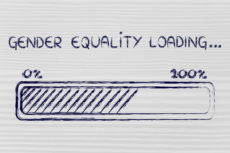 If you were to learn that the way to achieve gender wage parity is to build a less gender-equal society, would you be in favor of it? Two recent studies provide strong evidence that the wage gap between men and women has little to do with gender discrimination and everything to do with women being free to discriminate in how they spend their time.
If you were to learn that the way to achieve gender wage parity is to build a less gender-equal society, would you be in favor of it? Two recent studies provide strong evidence that the wage gap between men and women has little to do with gender discrimination and everything to do with women being free to discriminate in how they spend their time.
The first, “The Gender Earnings Gap in the Gig Economy: Evidence from over a Million Rideshare Drivers,” draws on detailed information from a million Uber rideshares and finds a roughly 7% gender earnings gap between men and women drivers. As all decisions reside in the hands of the drivers themselves, clearly employer or consumer discrimination can not account for the gap. The study’s authors conclude:
We find that the entire gender gap is caused by three factors: experience on the platform (learning-by-doing), preferences over where/when to work, and preferences for driving speed. This suggests that, as the gig economy grows and brings more flexibility in employment, women’s relatively high opportunity cost of non-paid-work time and gender-based preference differences can perpetuate a gender earnings gap even in the absence of discrimination.
Robert Higgs • Wednesday, March 7, 2018 •
 There’s a Catch-22 in regard to efforts aimed at diminishing state domination and enlarging genuine liberty. A substantial number of people may support these goals, but in order to achieve real gains, they must organize to raise money, build public support, and obstruct the state’s attempts to plunder and bully them. The catch is that the organizations they create are run by organizers or managers who have incentives to turn their organizations into vehicles for their own power-quest or for workaday jobbery. That is, all such organizations are vulnerable to corruption by the humans who run them. Such corruption not only undercuts the organizations’ appeal to people on the fence, but also undermines the determination of sincere, dedicated supporters of the ostensible goal.
There’s a Catch-22 in regard to efforts aimed at diminishing state domination and enlarging genuine liberty. A substantial number of people may support these goals, but in order to achieve real gains, they must organize to raise money, build public support, and obstruct the state’s attempts to plunder and bully them. The catch is that the organizations they create are run by organizers or managers who have incentives to turn their organizations into vehicles for their own power-quest or for workaday jobbery. That is, all such organizations are vulnerable to corruption by the humans who run them. Such corruption not only undercuts the organizations’ appeal to people on the fence, but also undermines the determination of sincere, dedicated supporters of the ostensible goal.
In sum, people (for external reasons) can’t get anywhere without organizations, but with organizations they are (for internal reasons) unlikely to make much headway. Political movements must motivate the mass of their followers with either ideological or material incentives. Because freedom-seekers, unlike other political actors, cannot promise followers a share of the loot—they seek no plunder—they must rely on ideology to carry the load. But ideological commitment is undercut by a growing awareness of corruption in the organizational leadership of their movement.
***
Robert Higgs is Senior Fellow in Political Economy at the Independent Institute and Editor at Large of The Independent Review. His latest book is Taking A Stand: Reflections on Life, Liberty, and the Economy.
Alvaro Vargas Llosa • Wednesday, March 7, 2018 •
 The Democrats could not have asked for a better ally than Donald Trump when it comes to trade protectionism. The president’s announcement that he will slap a 25 percent tariff on steel and 10 percent on aluminum is not only aligned with what most prominent Democrats, including Hillary Clinton, have been advocating for many years, but also conveniently timed (for them) to generate havoc in the Republican field in an election year.
The Democrats could not have asked for a better ally than Donald Trump when it comes to trade protectionism. The president’s announcement that he will slap a 25 percent tariff on steel and 10 percent on aluminum is not only aligned with what most prominent Democrats, including Hillary Clinton, have been advocating for many years, but also conveniently timed (for them) to generate havoc in the Republican field in an election year.
Experience should have disabused most of us by now of the notion that Republicans stand on the principle of free trade. (George W. Bush also raised tariffs on steel imports, and the Republicans were just as eager as the Democrats to avoid voting for the Trans-Pacific Partnership at the end of the Obama administration.)
Robert Higgs • Tuesday, March 6, 2018 •
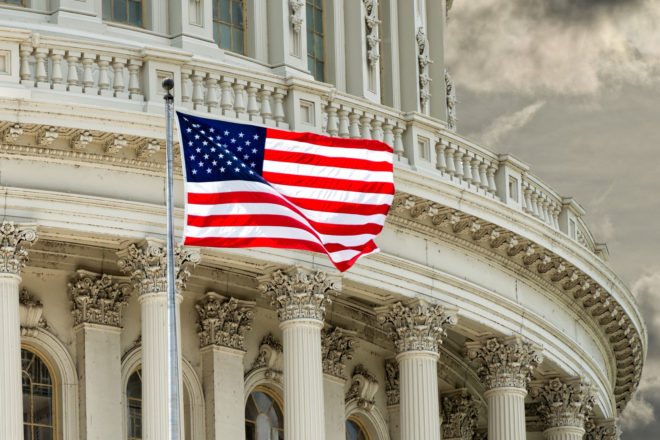 If an action is immoral for me and you, it is also immoral for others, including those who constitute the government. Election to public office is not a licence to lie, defraud, extort, rob, kidnap, or murder. Those who believe that government officials, employees, and contractors may morally do what other individuals may not do are morally bankrupt. The government has the power to act immorally—and does so as its standard operating procedure—but power and just right are completely different things. To affirm that might makes right in a moral sense is to affirm that one has simply chosen to abandon all pretense of taking morality seriously.
If an action is immoral for me and you, it is also immoral for others, including those who constitute the government. Election to public office is not a licence to lie, defraud, extort, rob, kidnap, or murder. Those who believe that government officials, employees, and contractors may morally do what other individuals may not do are morally bankrupt. The government has the power to act immorally—and does so as its standard operating procedure—but power and just right are completely different things. To affirm that might makes right in a moral sense is to affirm that one has simply chosen to abandon all pretense of taking morality seriously.
Gaze upon the members of Congress, the president and his lieutenants, the justices of the Supreme Court, and the leading figures of the government bureaucracies. As I do so, I cannot help but wonder: Who are these people? I am not personally acquainted with a single one of them; they are complete strangers to me. I have not contracted with them for the provision of any services, nor have I agreed to support them financially. Why then do these strangers presume to dictate to me what I must do and not do, and to threaten me with violence if I do not obey? They might as well be alien invaders from outer space.
***
Robert Higgs is Senior Fellow in Political Economy at the Independent Institute and Editor at Large of The Independent Review. His latest book is Taking A Stand: Reflections on Life, Liberty, and the Economy.
 Socialism’s appeal has always lain primarily in its vision of living in a fantasy land, a land of lollipops and lemonade, a land where everyone has plenty and all have the same. Aside from the utter impossibility of attaining such abundance without private property and free markets, this vision has a fatal element of abstraction from the realities of the Iron Law of Oligarchy. It declares that “society” or “the community” will own all the means of production, but in reality this communal ownership always boils down to de facto ownership by a political elite with untrammeled power and a determination to obliterate individual rights, first private property rights, then all other rights, including the entire litany of civil rights. Socialism is a mythical, impossible ideal employed as a rhetorical enticement to mobilize large groups in favor of collective action that leads ultimately if not immediately to their own enslavement. That so many young people in the West now regard socialism as the most desirable form of political economy is a tragedy in the making.
Socialism’s appeal has always lain primarily in its vision of living in a fantasy land, a land of lollipops and lemonade, a land where everyone has plenty and all have the same. Aside from the utter impossibility of attaining such abundance without private property and free markets, this vision has a fatal element of abstraction from the realities of the Iron Law of Oligarchy. It declares that “society” or “the community” will own all the means of production, but in reality this communal ownership always boils down to de facto ownership by a political elite with untrammeled power and a determination to obliterate individual rights, first private property rights, then all other rights, including the entire litany of civil rights. Socialism is a mythical, impossible ideal employed as a rhetorical enticement to mobilize large groups in favor of collective action that leads ultimately if not immediately to their own enslavement. That so many young people in the West now regard socialism as the most desirable form of political economy is a tragedy in the making.














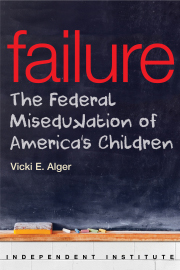

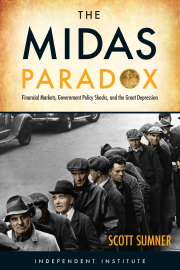


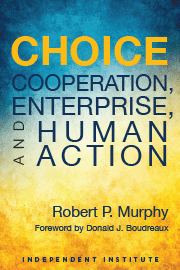
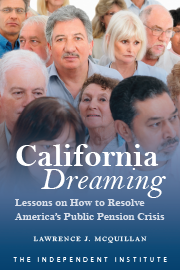


 Florida is now the first state in the country to offer students scholarships to attend safer schools.
Florida is now the first state in the country to offer students scholarships to attend safer schools. Socio-economic problems take two forms: one form is fake; the other is real.
Socio-economic problems take two forms: one form is fake; the other is real. One of the typical responses to criticism of a government policy, program, or other undertaking is the demand for an answer to the question, “What is your alternative?” Often this challenge demands a blueprint or other detailed plan for the alternative to the governmental status quo. Absent such a fully articulated plan, one’s criticism is often dismissed as mere carping by someone who has no idea about how to replace the present government undertaking.
One of the typical responses to criticism of a government policy, program, or other undertaking is the demand for an answer to the question, “What is your alternative?” Often this challenge demands a blueprint or other detailed plan for the alternative to the governmental status quo. Absent such a fully articulated plan, one’s criticism is often dismissed as mere carping by someone who has no idea about how to replace the present government undertaking.
 If you were to learn that the way to achieve gender wage parity is to build a less gender-equal society, would you be in favor of it? Two recent studies provide strong evidence that the wage gap between men and women has little to do with gender discrimination and everything to do with women being free to discriminate in how they spend their time.
If you were to learn that the way to achieve gender wage parity is to build a less gender-equal society, would you be in favor of it? Two recent studies provide strong evidence that the wage gap between men and women has little to do with gender discrimination and everything to do with women being free to discriminate in how they spend their time. There’s a Catch-22 in regard to efforts aimed at diminishing state domination and enlarging genuine liberty. A substantial number of people may support these goals, but in order to achieve real gains, they must organize to raise money, build public support, and obstruct the state’s attempts to plunder and bully them. The catch is that the organizations they create are run by organizers or managers who have incentives to turn their organizations into vehicles for their own power-quest or for workaday jobbery. That is, all such organizations are vulnerable to corruption by the humans who run them. Such corruption not only undercuts the organizations’ appeal to people on the fence, but also undermines the determination of sincere, dedicated supporters of the ostensible goal.
There’s a Catch-22 in regard to efforts aimed at diminishing state domination and enlarging genuine liberty. A substantial number of people may support these goals, but in order to achieve real gains, they must organize to raise money, build public support, and obstruct the state’s attempts to plunder and bully them. The catch is that the organizations they create are run by organizers or managers who have incentives to turn their organizations into vehicles for their own power-quest or for workaday jobbery. That is, all such organizations are vulnerable to corruption by the humans who run them. Such corruption not only undercuts the organizations’ appeal to people on the fence, but also undermines the determination of sincere, dedicated supporters of the ostensible goal. The Democrats could not have asked for a better ally than Donald Trump when it comes to trade protectionism. The president’s
The Democrats could not have asked for a better ally than Donald Trump when it comes to trade protectionism. The president’s  If an action is immoral for me and you, it is also immoral for others, including those who constitute the government. Election to public office is not a licence to lie, defraud, extort, rob, kidnap, or murder. Those who believe that government officials, employees, and contractors may morally do what other individuals may not do are morally bankrupt. The government has the power to act immorally—and does so as its standard operating procedure—but power and just right are completely different things. To affirm that might makes right in a moral sense is to affirm that one has simply chosen to abandon all pretense of taking morality seriously.
If an action is immoral for me and you, it is also immoral for others, including those who constitute the government. Election to public office is not a licence to lie, defraud, extort, rob, kidnap, or murder. Those who believe that government officials, employees, and contractors may morally do what other individuals may not do are morally bankrupt. The government has the power to act immorally—and does so as its standard operating procedure—but power and just right are completely different things. To affirm that might makes right in a moral sense is to affirm that one has simply chosen to abandon all pretense of taking morality seriously.